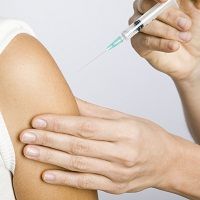Zoster Vaccination in Patients with Rheumatoid Arthritis: Time to Change the Recommendation?
Administration of the varicella zoster vaccine is safe in patients with rheumatoid arthritis or other rheumatic conditions who are taking biologic disease-modifying anti-rheumatic drugs, according to study results presented at the 2014 American College of Rheumatology annual meeting.

Administration of the varicella zoster vaccine is safe in patients with rheumatoid arthritis (RA) or other rheumatic conditions who are taking biologic disease-modifying anti-rheumatic drugs (DMARDs), according to a new study presented here at the American College of Rheumatology.
The study provides support for a change in the recommendation from the Centers for Disease Control that RA patients on biologic DMARDs forego vaccination, over concern that the live attenuated virus in the vaccine will lead to disseminated herpes zoster (HZ) in immunocompromised patients.
The study showed that of over 300 patients, most with RA, who were vaccinated while on DMARD therapy, none developed disseminated HZ in up to 2 years of follow-up.
HZ is common in the United States, occurring in 1 in 3 people over the lifetime, with advancing age and immunosuppressive therapy both key risk factors. People with RA develop HZ at 1.5 to 2 times the age-adjusted rate within the population. CDC recommendations state that vaccination should occur before beginning immunosuppressive therapy with biologic DMARDs, or occur at least a month after DMARD discontinuation.
“However, recent large database studies have not found an increase in zoster complications in patients inadvertently given the vaccine while on biologics,” according to Stephen Lindsey, MD, of Ochsner Health System in Baton Rouge, Louisiana, and a lead author on the new study. “These data encouraged our group to evaluate the safety of this vaccine in current biologics users.”
Beginning in 2012, the researchers prospectively studied 160 patients with RA, psoriatic arthritis, or spondyloarthropathies receiving intravenous biologics, as well as 142 patients with these conditions receiving subcutaneous biologics. Ninety-three percent of IV patients and 66 percent of SC patients had RA. Asa group, the patients received the full range of biologics, with Remicade the most common IV drug and Enbrel the most common SC drug.
Vaccinations were given at a scheduled dosing visit of the biologic, with the scheduled dose withheld for that visit.
Of the 160 IV patients, 110 (68 percent) have been vaccinated. Of the 142 SC patients, 42 (32 percent) have been vaccinated. No patient in either group developed HZ within six weeks of vaccination, a critical post-vaccination period for emergence of a safety signal. Two patients in the IV groupdeveloped HZ at 16 and 20 months post-vaccination; none in the SC group did. No cases of disseminated HZ occurred.
Based on these results, Lindsey said, “I feel we can begin to safely vaccinate thousands of patient who have been on biologics for years and are presently unvaccinated and at high risk.”
A recent update from the American College of Rheumatology said that data from a recent observational study in a similar population “suggests the possibility that the vaccine might be safe to give to patients receiving treatment with biologics. Further prospective trials of shingles vaccination in patients with autoimmune disease are indicated.”